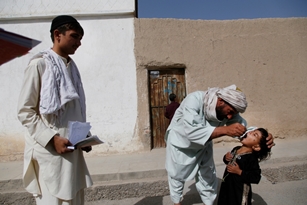 Kabul, 15 May 2017 - The Ministry of Public Health of Afghanistan, together with WHO and UNICEF, launched today the second spring round of National Immunization Days (NIDs) for polio eradication in 2017. Over 9.5 million children under the age of 5 will be vaccinated against polio and more than 5.7 million children aged 2 to 5 will be given Albendazole deworming tablets during the campaign that runs until 19 May.
Kabul, 15 May 2017 - The Ministry of Public Health of Afghanistan, together with WHO and UNICEF, launched today the second spring round of National Immunization Days (NIDs) for polio eradication in 2017. Over 9.5 million children under the age of 5 will be vaccinated against polio and more than 5.7 million children aged 2 to 5 will be given Albendazole deworming tablets during the campaign that runs until 19 May.
The Minister of Public Health H.E. Dr. Ferozuddin Feroz emphasized the importance of this campaign because the polio high-transmission season has started. “We must reach all children under five years of age with vaccines, regardless of where they live,” he said.
“It is critical that the safety of our committed volunteers and frontline health workers is ensured so they can successfully carry out their important duties in delivering health services to every Afghan household to protect all children from this paralyzing disease.”
The Minister of Public Health reiterated the importance of the polio vaccine for ensuring all children are protected from the crippling effects of polio. Most countries are now free from polio as a result of immunization and Afghanistan is one of only three countries where polio still exists. Afghanistan has made significant progress in the effort to stop polio and is accelerating efforts to ensure polio is finished for good.
This national campaign will be carried out by 67 000 polio workers who will go from house to house in their communities to vaccinate children. On Friday of this week, polio teams will revisit households where children were missed the first time the vaccinators visited to ensure that all children are vaccinated and protected.
Three polio cases have been reported in 2017, from Helmand, Kandahar and Kunduz provinces. In 2016, 13 polio cases were reported, down from 20 in 2015. Most of Afghanistan remains polio-free, but wild poliovirus continues to circulate in localized geographical areas in the eastern, southern and south-eastern parts of the country.


